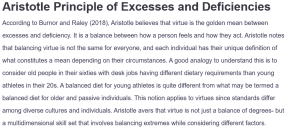Aristotle Principle of Excesses and Deficiencies
According to Burnor and Raley (2018), Aristotle believes that virtue is the golden mean between excesses and deficiency. It is a balance between how a person feels and how they act. Aristotle notes that balancing virtue is not the same for everyone, and each individual has their unique definition of what constitutes a mean depending on their circumstances. A good analogy to understand this is to consider old people in their sixties with desk jobs having different dietary requirements than young athletes in their 20s. A balanced diet for young athletes is quite different from what may be termed a balanced diet for older and passive individuals. This notion applies to virtues since standards differ among diverse cultures and individuals. Aristotle avers that virtue is not just a balance of degrees- but a multidimensional skill set that involves balancing extremes while considering different factors.
People’s attitude toward temperance and self-control is a perfect example illustrating Aristotle’s principle of virtue lying at the golden mean between excesses and deficiency. If people overindulge in alcohol consumption, they are likely to expose themselves to economic, health, and social issues. On the other hand, total avoidance could lead to a lack of enjoyment, boredom, and a likelihood of missing networking opportunities. Therefore, an ideal choice would be to join others in moderately partaking alcoholic drinks during social events, as long as one’s culture, religious affiliation, and personal health and values allow.
Aristotle’s principle is a good way to think about virtue. It helps people balance what is good for them, while also considering other people’s needs (Burnor & Raley, 2018). If people’s virtues demonstrate excesses or deficiency, they may hurt themselves or others. Therefore, virtuous behaviour requires balancing excesses and deficiency while considering additional factors such as personal values, culture, and religion, among others (Burnor & Raley, 2018). However, the same cannot be said of morality. This is because morality involves distinguishing right from wrong, leading to universal morals (Chowdhury, 2018). As such, there are no excesses or deficiencies when it comes to morality.
References
Burnor, R., & Raley, Y. (2018). Ethical choices: an introduction to moral philosophy with cases. New York Oxford University Press.
Chowdhury, M. (2018). Emphasizing Morals, Values, Ethics, And Character Education In Science Education And Science Teaching. https://files.eric.ed.gov/fulltext/EJ1095995.pdf
ORDER A PLAGIARISM-FREE PAPER HERE
We’ll write everything from scratch
Question
DISCUSSION POST 6
Do not use AI to generate or edit your post. Do not use AI to generate or edit your responses to your peers.
In this module, we discussed Aristotle’s idea that all virtue is a mean (or average) between extremes. Can you give your own example of this, on an item that is not in the book or the module? Do you think this is a good way to think about virtue, and by extension, about morality?

Aristotle Principle of Excesses and Deficiencies

